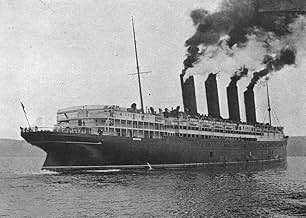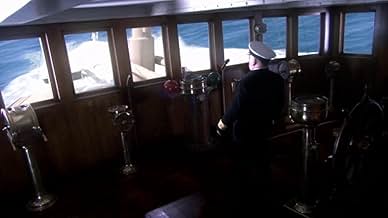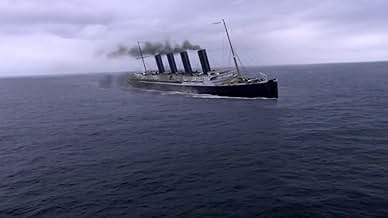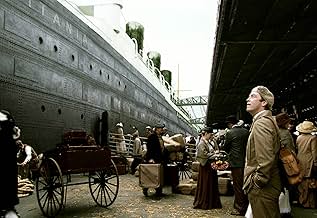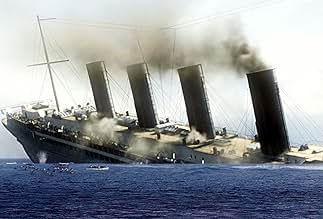A dramatization of the notorious World War I torpedoing of the ocean liner, RMS Lusitania.A dramatization of the notorious World War I torpedoing of the ocean liner, RMS Lusitania.A dramatization of the notorious World War I torpedoing of the ocean liner, RMS Lusitania.
- Director
- Writers
- Stars
Florian Panzner
- Lt. Capt. Schwieger
- (as Florian Panzer)
Madeleine Garrood
- Avis Dolphin
- (as Maddeleine Garrood)
Andre Weideman
- Johnston
- (as Andre Weiderman)
Stephen Jennings
- Carson
- (as Steven Jennings)
Robyn LeAnn Scott
- Peggy
- (as Robyn Scott)
- Director
- Writers
- All cast & crew
- Production, box office & more at IMDbPro
Featured reviews
Indeed, this one is remarkably controlled, but it does include key facts that the British wanted covered up:
And much more. Anybody who argues anything else has not studied the subject in depth; one need only consult THE authority on the subject, Patrick Beesley, in his authoritative Room 40 to know this. None of this is "politics": it's all facts.
- that their embargo of Germany was the first and bigger war crime;
- that Churchill wanted the Lusitania sunk, and in typically murderous fashioned schemed to make it happen;
- that the explosion of illegally carried war materials, especially gun cotton, caused the second and greater explosion;
- that the Admiralty first covered up and then destroyed all materials relating to the incident;
And much more. Anybody who argues anything else has not studied the subject in depth; one need only consult THE authority on the subject, Patrick Beesley, in his authoritative Room 40 to know this. None of this is "politics": it's all facts.
The movie was okay and the cast did a wonderful job delivering the emotional impact the movie should have. What also worked was the actual footage at the end. What was horrible was depicting Winston Churchill and the British hierarchy as actually evil. That was unnecessary and pure nonsense.
"Lusitania, murder on the Atlantic" may well be considered as a cheaper version of the 1998-blockbuster "Titanic", starring Kate Winslet and Leonardo DiCaprio. Although the Lusitania-film provides good entertainment, it leads you on false tracks when it comes to history.
The big question with Lusitania, unsolved to this day: the ship was too big to sink with only one torpedo. However, historically it is beyond doubt that she was sunk by just one torpedo. Even more so, after being hit she sank pretty fast.
Every fisherman at Ireland's Southern coast can exactly point out the location of the Lusitania-wreck, about 100 meters down. So the wreck has already been investigated by several diving parties, among them one led by Robert Ballard in 1993. Ballard is the American who discovered the wrecks of the "Titanic", as well as that of Hitler's famous battleship "Bismarck". Ballard thinks that the torpedo hit one of Lusitania's coal-stores, making the coal-dust explode. Carrying this explosion on to neighboring coal-stores. Later on another diving party found considerable quantities of unexploded ammunition inside the Lusitania.
Given its status as a passenger-ship carrying civilians, Lusitania's sinking in May 1915 did the German cause in World War I no good.
The film states that this disaster marked a turning point in the history of warfare, by dropping humanity and chivalry completely. This is wrong: for instance, when the German army invaded Belgium less than a year before, their behavior against defenseless Belgian civilians still evokes horror to this day.
Nevertheless Lusitania's sinking functioned well to win over the USA for their military participation in World War I. In Belgium people do not speak English, so German atrocities over there had been missed by the people of the distant USA.
Another false understanding widely current in the Anglo-Saxon part of the world: in shipping-disasters Lusitania comes only second after Titanic.
Counting in lost human lives, the greatest shipping disaster of all was the torpedoing of the German vessel "Wilhelm Gustloff" by a Soviet-Russian submarine. This happened in January 1945, when the Hitler-vessel carried about 10.000 refugees from Germany's threatened Eastern provinces westwards to safety. Nearly all these people drowned in the icy Baltic Sea, making their number of casualties at least four times as big as that of the Titanic.
The big question with Lusitania, unsolved to this day: the ship was too big to sink with only one torpedo. However, historically it is beyond doubt that she was sunk by just one torpedo. Even more so, after being hit she sank pretty fast.
Every fisherman at Ireland's Southern coast can exactly point out the location of the Lusitania-wreck, about 100 meters down. So the wreck has already been investigated by several diving parties, among them one led by Robert Ballard in 1993. Ballard is the American who discovered the wrecks of the "Titanic", as well as that of Hitler's famous battleship "Bismarck". Ballard thinks that the torpedo hit one of Lusitania's coal-stores, making the coal-dust explode. Carrying this explosion on to neighboring coal-stores. Later on another diving party found considerable quantities of unexploded ammunition inside the Lusitania.
Given its status as a passenger-ship carrying civilians, Lusitania's sinking in May 1915 did the German cause in World War I no good.
The film states that this disaster marked a turning point in the history of warfare, by dropping humanity and chivalry completely. This is wrong: for instance, when the German army invaded Belgium less than a year before, their behavior against defenseless Belgian civilians still evokes horror to this day.
Nevertheless Lusitania's sinking functioned well to win over the USA for their military participation in World War I. In Belgium people do not speak English, so German atrocities over there had been missed by the people of the distant USA.
Another false understanding widely current in the Anglo-Saxon part of the world: in shipping-disasters Lusitania comes only second after Titanic.
Counting in lost human lives, the greatest shipping disaster of all was the torpedoing of the German vessel "Wilhelm Gustloff" by a Soviet-Russian submarine. This happened in January 1945, when the Hitler-vessel carried about 10.000 refugees from Germany's threatened Eastern provinces westwards to safety. Nearly all these people drowned in the icy Baltic Sea, making their number of casualties at least four times as big as that of the Titanic.
If you want the best info on it read the book Dead Wake. excellent in the details. makes you think you where on it with the detail info on passengers. used the war diary from the german sub commander and he reviewed the books and pics from the sinking. he obtained some very recent info from the British secret service who knew where the sub was but didint tell the ship. a sad bunch of unfortunate circumstances.
People always talk about Titanic this Titanic that, it was an accident waiting to happen. People died yes on that ship where it could have been averted. The Lusitania however, was the beginning and the end for the Germans and eventually lose World War One. The sinking of the ship was a barbaric act and no doubt a sad ending for those who died. Unlike the Titanic where there wasn't enough lifeboats, Lusitania had all the safety feature that was built into after Titanic like double hull and more then enough lifeboat for the passenger, but wasn't build to stop a torpedo.
The movie itself was really good. I'm surprise that guy from Mummy was in the movie and instead of being a comic relief, gave a very serious acting in the movie where he was a victim on the ship. The other people in the movie also showed the same and for a quality we expected in a docu-drama movie, the movie more the met my expectation. The sinking was very well done and was more sad then Titanic. Thank goodness there is none of this Jack and Rose crap in it.
Otherwise, a very well made movie and one that should be a reminder about how Lusitania became a pawn in the World War.
The movie itself was really good. I'm surprise that guy from Mummy was in the movie and instead of being a comic relief, gave a very serious acting in the movie where he was a victim on the ship. The other people in the movie also showed the same and for a quality we expected in a docu-drama movie, the movie more the met my expectation. The sinking was very well done and was more sad then Titanic. Thank goodness there is none of this Jack and Rose crap in it.
Otherwise, a very well made movie and one that should be a reminder about how Lusitania became a pawn in the World War.
Did you know
- TriviaThe U-20 set was the original U-96 set used in Le Bateau (1981). The Type U-19 of World War I and Type VIIC of World War II had similar internal dimensions. The Lusitania scenes were filmed with full-scale sections of the ship off the coast of South Africa while the U-20 scenes were filmed at Bavaria Studios in Munich using the then-newly refurbished 25-year-old U-boat set, studio model and full-size prop originally built for the West German war film Das Boot (1981).
- GoofsOn at least two occasions the captain of the U 20 gives the order to "blow ballast" when he wants to dive the submarine. This order would result in all water being blown out of the ballast tanks and should only be given to surface the boat. In order to dive a submarine one must flood the ballast tanks with water.
- Quotes
Captain Turner: They're not interested in the truth.
- Crazy creditsAdrian Topol's character name is pronounced Voegele in the German dialogue and is spelled this way in the accompanying English subtitles. However in the credits it is spelled Vogele. Correct German spelling uses either "ö" (o with an umlaut) or else "oe".
- ConnectionsFeatured in Titanic al detalle (2013)
Details
- Release date
- Countries of origin
- Languages
- Also known as
- Sinking of the Lusitania: Terror at Sea
- Production companies
- See more company credits at IMDbPro
Contribute to this page
Suggest an edit or add missing content

